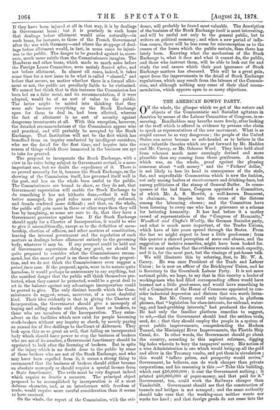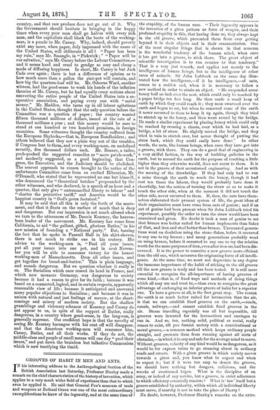THE AMERICAN ROWDY PARTY.
ON the whole, the glimpse which we get of the nature and objects of the Communistic and Socialist agitators in America by means of the Labour Committee of Congress, is re- assuring. Bondholders may breathe more freely, after looking at the stuff which is offered in evidence by persons who claim to speak as representatives of the new movement. What is so stupid cannot be so very dangerous ; the people of the United States can never become so soft-headed as to believe in the crazy infantile theories which are put forward by Mr. Maddox and Mr. Carsey, or Mr. Osborne Ward. They have held aloof from schemes much more cunningly devised and more plausible than any coming from these gentlemen. A nation which was, on the whole, proof against the pleasing nonsense about "soft money" and the "Fathers' dollar," is not likely to lose its head in consequence of the stale, flat, and unprofitable Communism which is now the fashion, not only among loafers at street-corners and drinking-bars, but among politicians of the stamp of General Butler. In conse- quence of the bad times, Congress appointed a Committee, of which Mr. A. S. Hewitt, a well-known Democrat, is chairman, to inquire into the cause of the distress among the labouring classes ; and the Committee have been listening to every one who has a grievance or a scheme for bettering humanity. It has had before it a motley crowd of representatives of the "Congress of Humanity," Woodhull and Giggles Weekly, the German Socialist party, and what is much more important, of the Trades Unions, which have of late years spread through the States. From the last we might expect to hear a little good-sense ; from this quarter a shrewd perception of sores and abuses, and the suggestion of incisive remedies, might have been looked for. But we must confess that the evidence reveals no such capacity, and it is, for the most part, but the rinsings of pot-house talk. We will illustrate this by referring, first, to Mr. W. A. Carsey. He was once President of the Trade and Labour Union ; he is now an officer of the Bricklayers' Union, and he is Secretary to the Greenback Labour Party. It is not mere national pride, we hope, to say that in this country a leader of working-men who had filled corresponding offices would have learned not a little good-sense, and would have something to tell a Committee of the House of Commons appointed to con- sider industrial depression and distress that was worth listen- ing to. But Mr. Carsey could only intimate, in platform phrases, that "legislation for class-interests, for railroad, water- ing, and land-grabbing interests," had produced the distress. He had only the familiar platform remedies to suggest, to wit,—that the Government should lend the settlers tools, seed, &c. ; that they should employ the people in a system of great public improvements, comprehending the Hudson Tunnel, the Mississippi River Improvements, the Florida Ship Canal, &c. In other words, the Government should go about the country, according to this sapient reformer, digging big holes wherein to bury the taxpayers' money. His notion of a wise Administration is one which would bring up all the gold and silver in the Treasury vaults, and put them in circulation ; this would "inflate prices, and prosperity would revive." Government, he believes, can do work cheaper than private corporations, and his reasoning is this :—" Take this building, which cost $10,000,000; it cost the Government nothing ; it printed $40,000,000 of paper-money, and that paid for it." Government, too, could work the Railways cheaper than Vanderbilt. Government should see that the construction of tunnels and bridges is not scamped ; and the same authority should take care that the working-man neither wants nor works too hard ; and that foreign goods do not come into the country, and that raw produce does not go out of it. Why the Government should hesitate in bringing in the happy times when every poor man shall go halves with every rich man, and the capitalists shall black the boots of the working- man, is a puzzle to Mr. Carsey. Why, indeed, should poverty exist any more, when paper, duly impressed with the name of the United States, will obliterate it all ? "Paper has been my ruin," says Mr. Smangle, in " Pickwick ; " "Paper will be our salvation," says Mr. Carsey before the Labour Committee,— and it seems hard and cruel to grudge so easy and cheap a mode of diffusing happiness. In short, Mr. Carsey is but Jack Cade over again ; there is but a difference of opinion as to how much more than a gallon the pint-pot will contain, and how big the quartem-loaf will be. Mr. Osborne Ward, another witness, had the good-sense to wash his hands of the inflation theories of Mr. Caney, but he had equally crazy notions about converting the entire people of the United States into a co- operative association, and paying every one with "social money." Mr. Maddox, who turns up in all labour agitations in the United States, thought that the only question before the Committee was a question of paper ; the country wanted fifteen thousand millions of dollars, issued at the rate of a thousand millions a year ; and this money would be sure to stand at one hundred or two hundred premium, in foreign countries. Some witnesses thought the country suffered from the European Shylocks,—that is, European Bondholders ; and others believed that they saw a plain way out of the troubles, if Congress lent to them, and every working-man, on undefined security, five thousand dollars each. Mr. Benner, a tailor, pooh-poohed the suggested remedies as "mere patch-work," and modestly suggested, as a good beginning, that Con- gress, the Executive, and the Judiciary should be abolished. The nearest approach to reason brought to the notice of the unfortunate Committee came from an excited Hibernian, Mr. O'Donnell, who stated that he represented no one but himself, who denounced the "theoretical botches" propounded by the other witnesses, and who declared, in a speech of an hour and a quarter, that only give "untrammelled liberty to labour" and "shatter the protective tariff," and America would be the happiest country in "God's green footstool."
It may be said that all this is only the froth of the move- ment, and that it floats on the surface of much that is deep and dangerous. But our impression is not much altered when we turn to the utterances of Mr. Dennis Kearney, the heaven- born leader of the movement. Mr. Kearney has come from California, to aid "the gallant, gifted, glorious Butler," in his new mission of founding a "National party." But, barring the fact that he spoke in Faneuil Hall in his shirt-sleeves, there is not much to strike one in his oratory. His advice to the working-men is, "Pool all your issues, put all your issues into one pot, and in next Novem- ber you will be able to announce victory for the honest working-men of Massachusetts. Drop all other issues, and get together for bread-and-butter." This is plain language, and sounds dangerous. But we question whether it really is so. The Socialism which once reared its head in France, and which now menaces Germany, was dangerous to society because it had a reason to give for its faith ; because it was based on a connected, logical, and in certain respects, apparently reasonable view of life ; because it anticipated and answered many popular objections to Socialism ; and because it was in unison with natural and just feelings of sorrow, at the short- comings and misery of modern society. But the shallow grumblings and visionary schemes of Kearney and Carsey do not appear to us, in spite of the support of Butler, really dangerous, in a country where good-sense, in the long-run, is generally supreme. Our confident hope is that the novelty of seeing Mr. Kearney harangue with his coat off will disappear, and that the American working-men will renounce him, Carsey, Butler, and all their works. If they do not, the middle-class and people of small means will one day "pool their issues," and put down the brainless but talkative Communism which is now terrifying the timid.































 Previous page
Previous page